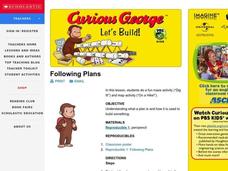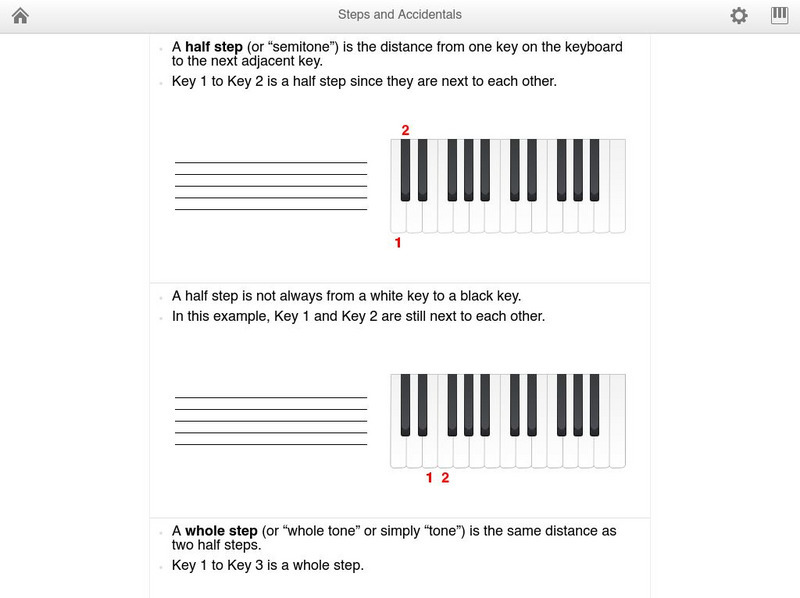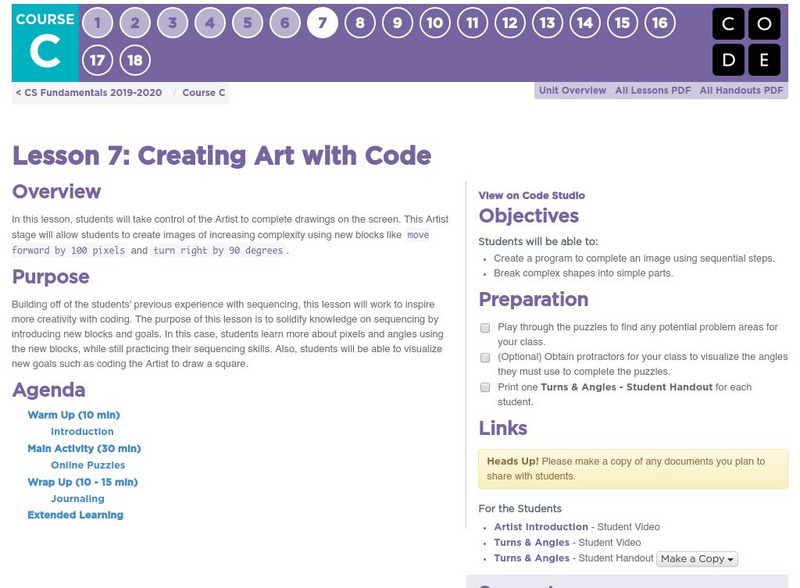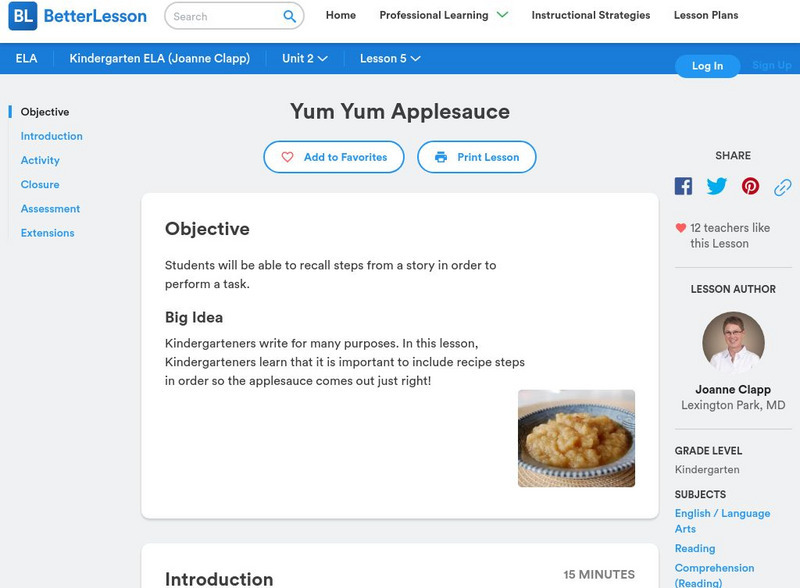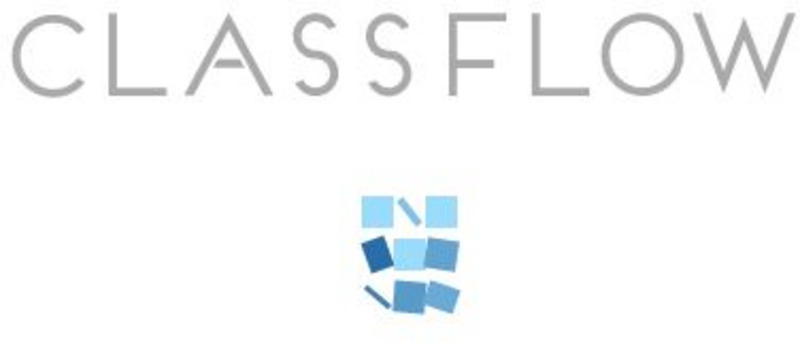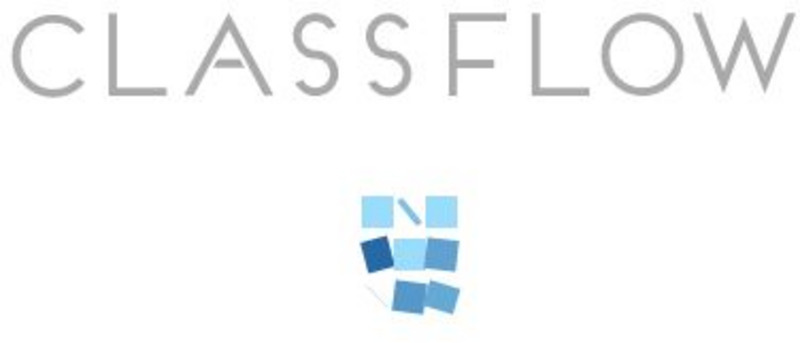Curated OER
Presenting Information
How do you make a pizza? Scholars examine a recipe for one of their favorite dishes. After reading the eight steps, they must re-write the steps in order. Although this offers great printing practice, younger writers may find the narrow...
Curated OER
Let's Build
Students observe and discuss a picture of Curious George building a bridge and discuss what it means to build, plan and design a project. As a class, they list things they need to do in oder to build something and explore how a compass...
Curated OER
Music Elements For Second Grade
Second graders are exposed to a variety of attributes of melody in seven lessons of this unit. the notation in treble clef, pitch, and the movements of the melody are presented in these lessons.
Curated OER
Making Real-Life Connections and Introducing Expository Text
Third graders write directions. In this real-life connections lesson, 3rd graders write the steps for making a peanut butter and jelly sandwich. After writing, students share their papers and actually make the sandwiches following the...
Curated OER
Cube Count
In this cube counting activity, students solve 5 word problems that refer to the illustration of a stack of cubes. First, they determine how many cubes would be needed to make four steps, then seven and eight steps. Students also...
Curated OER
Step by Step
Students measure the rise and run of steps from a place that holds meaning for them. They write a reflection (in the form of a journal entry, poem, or short story) regarding this significant place.
Curated OER
Follow The Leader - Soca Style
Students participate in a fun and creative experience in dance. This is a great activity for warm-ups, the end of class, all-school assemblies and family nights!
Music Theory
Music theory.net: Steps and Accidentals
Provides an explanation of half steps, whole steps, flats, and sharps. Illustrated examples accompany these definitions.
TeachEngineering
Teach Engineering: What Is Engineering? What Is Design?
An overview of engineering and design which introduces the students to the basic steps of the engineering design process. This lesson challenges students to plan a picnic for their friends by considering its various components as they go...
Other
Stat Soft: Statistics Glossary
Dozens of statistical terms are defined and illustrated in this glossary.
Code.org
Code.org: Cs Fundamentals: Creating Art With Code
Solidify students' knowledge on sequencing by introducing new blocks and goals. In this case, students learn more about pixels and angles using the new blocks, while still practicing their sequencing skills. Also, students will be able...
Code.org
Code.org: Cs Fundamentals: My Robotic Friends
This unplugged lesson brings the class together as a team with a simple task to complete: get a "robot" to stack cups in a specific design. This activity lays the groundwork for the programming that students will do throughout the course...
Code.org
Code.org: Cs Fundamentals: The Big Event
Learners will soon learn that events are a great way to add flexibility to a pre-written algorithm. Sometimes you want your program to be able to respond to the user exactly when the user wants it to. Events can make your program more...
Better Lesson
Better Lesson: Yum Yum Applesauce
Kindergarteners write for many purposes. In this lesson, kindergarteners learn that it is important to include recipe steps so the applesauce comes out just right!
Other
Swing Dance Steps: Opposing Charleston Steps
This is a very detailed writen instruction of how to dance the "opposing charleston step". There are no illustrations in this site. There are some listing of dance music for this form of dancing.
ClassFlow
Class Flow: Research Questions
[Free Registration/Login Required] This lesson explores the steps of the research process - selecting an appropriate research topic, and delving more into the topic.CCSS.ELA-Literacy.CCRA.W.8
ClassFlow
Class Flow: Steps in a Process Using Halloween
[Free Registration/Login Required] This flipchart helps students to understand steps in a process by using Halloween examples (carving pumpkins).
ClassFlow
Class Flow: Thinking Maps the Flow Map
[Free Registration/Login Required] Teach your students to visualize the writing process using this graphic organizer as a tool.
Sophia Learning
Sophia: Sequencing Transition Words
This lesson goes over sequence transition words and how they are used.



